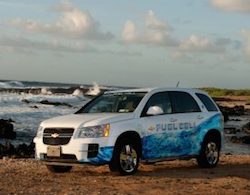General Motors’ fleet of fuel cell vehicles has surpassed the three million mile mark running on hydrogen-power. According to GM, some individual vehicles have accumulated more than 120,000 miles and by using hydrogen, the fleet has avoided 157,894 gallons of gasoline consumption. This specially equipped fleet of Chevrolet Equinox Fuel Cell vehicles are part of  GM’s 119-vehicle Project Driveway program, which launched in 2007. Since then, more than 5,000 drivers have provided feedback on the functionality and drivability of fuel cell technology.
GM’s 119-vehicle Project Driveway program, which launched in 2007. Since then, more than 5,000 drivers have provided feedback on the functionality and drivability of fuel cell technology.
“Hydrogen fuel cell technology is an important part of GM’s advanced propulsion portfolio and we continue to make substantial progress in furthering this technology,” said Charlie Freese, executive director of GM’s global fuel cell engineering activities. “These vehicles have operated through seven full winters and a wide range of environmental conditions, proving that fuel cells can meet the demands of real-world drivers.”
GM has announced several fuel cell-related collaborations over the past few years. In July, 2013, GM and Honda announced a long-term collaboration to co-develop next-generation fuel cell and hydrogen storage systems, aiming for potential commercialization in the 2020 time frame. In addition, GM and Honda are working together with stakeholders to further advance refueling infrastructure, which is critical for the long-term viability and consumer acceptance of fuel cell vehicles.
Also last year GM opened a new state-of-the-art Fuel Cell Development Laboratory at GM Powertrain World Headquarters in Pontiac, Mich. In September, 2013 GM and the U.S. Army Tank Automotive Research, Development & Engineering Center (TARDEC) jointly announced an expansion of their relationship for testing automotive fuel cell technology.

